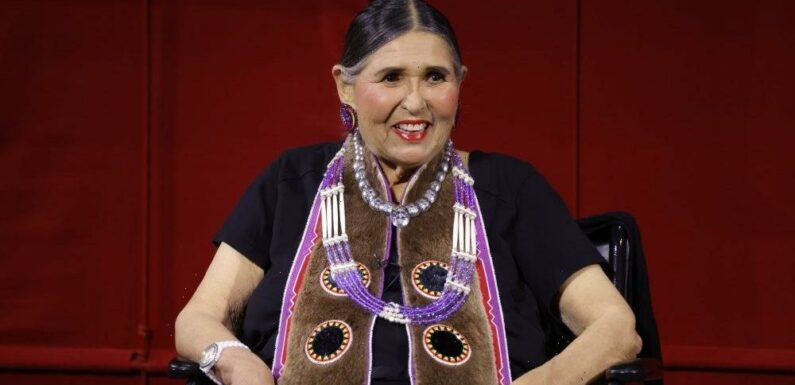
Sacheen Littlefeather, who declined Marlon Brando’s Oscar for “The Godfather” on his behalf at the 1973 Academy Awards, died Sunday, the Academy of Motion Pictures said.
In June, the Academy of Motion Pictures Arts and Sciences apologized to Littlefeather for her treatment at the Oscars that night. Littlefeather attended an in-person presentation of the apology at the Academy Museum on Sept. 17. She had been escorted off the stage with audience members booing after her one-minute speech on Native American rights.
“He very regretfully cannot accept this very generous award,” Littlefeather said to the Academy Awards audience. “And the reasons for this being are the treatment of American Indians today by the film industry… and on television in movie re-runs, and also with recent happenings at Wounded Knee.”
Littlefeather, born Marie Louise Cruz in Salinas, Calif., became interested in Native American issues in college and participated in the 1970 occupation of Alcatraz Island and adopted her name during that time.
After college, she joined SAG and reportedly met Brando, who took an interest in Native American issues, through Francis Ford Coppola who like Littlefeather, lived in San Francisco.
In a recent interview, Littlefeather told Variety what it was like to attend the Oscars on Brando’s behalf.
“It was my first time at the Academy Awards. I made it through my first hurdle, promising Marlon Brando that I would not touch that Oscar. But, as I walked off that stage, I did in the ways of courage, honor grace, dignity and truthfulness. I did so in the ways of my ancestors and the ways of Indigenous women.
I was met with the stereotypical tomahawk chop, individuals who called at me, and I ignored all of them. I continued to walk straight ahead with a couple of armed guards beside me, and I held my head high and was proud to be the first Indigenous woman in the history of the Academy Awards to make that political statement.
At that time in 1973, there was a media blackout on Wounded Knee and against the American Indian Movement that was occupying it. Marlon had called them in advance and asked them to watch the Academy Awards, which they did. As they saw me, up on stage, refusing that Academy Award for the stereotypes within the film industry, and mentioning Wounded Knee in South Dakota, it would break the media boycott.”
Read More About:
Source: Read Full Article